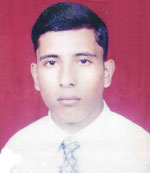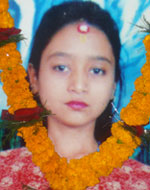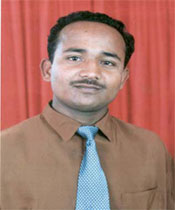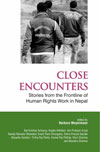Related Links
Case Updates
Krishna Adhikari
 On 6 June 2004, Krishna Prasad Adhikari, a resident of Fujel village of Gorkha District, was murdered in Chitwan District by Maoist cadres. Krishna Prasad was visiting his grandparents after having taken the SLC examinations, and he was abducted from Bakullahar Chowk by men who came on a motorcycle ...
On 6 June 2004, Krishna Prasad Adhikari, a resident of Fujel village of Gorkha District, was murdered in Chitwan District by Maoist cadres. Krishna Prasad was visiting his grandparents after having taken the SLC examinations, and he was abducted from Bakullahar Chowk by men who came on a motorcycle ... Maina Sunuwar
 Around 6 am on February 17, 2004, a group of RNA soldiers arrested Ms
Maina Sunuwar, a 15-year-old schoolgirl of Kharelthok VDC-6, Kavre
district. She disappeared since her arrest. Her family members, with
support from villagers and school where Maina was a student, visited
detention centers ...
Around 6 am on February 17, 2004, a group of RNA soldiers arrested Ms
Maina Sunuwar, a 15-year-old schoolgirl of Kharelthok VDC-6, Kavre
district. She disappeared since her arrest. Her family members, with
support from villagers and school where Maina was a student, visited
detention centers ... Sanjeev Kumar Karna
 Sanjeev Kumar Karna was one among the 11 persons arrested on October 8, 2003. On that fateful day, they had gone to attend a picnic program organized by the students at a place called Kariyachauri VDC-4, and from picnic, they went to Kataiya Chowri Area of Dhanusha district where they ate some food ...
Sanjeev Kumar Karna was one among the 11 persons arrested on October 8, 2003. On that fateful day, they had gone to attend a picnic program organized by the students at a place called Kariyachauri VDC-4, and from picnic, they went to Kataiya Chowri Area of Dhanusha district where they ate some food ... Arjun Bahadur Lama
Hari Prasad Bolakhe
Sarala Sapkota
Birendra Shah
Bishwanath Parajuli, Tom Nath Poudel and Dhan Bahadur Tamang
Chot Nath Ghimire and Shekhar Nath Ghimire
Bhauna Tharu
AF Organised Strategic Meeting on CRSV Data Consolidation
The event marked a significant moment in the ongoing efforts to address the complex and sensitive issue of CRSV within the evolving Transitional Justice (TJ) framework in Nepal.
Participants, including key figures from civil society organisations, discussed the challenges and opportunities in collecting, managing, and consolidating CRSV data, especially in light of the Truth and Reconciliation Commission (TRC) 's upcoming work.
The meeting's agenda revolved around the critical need for a coordinated approach to handling CRSV cases, which are often underreported and mishandled due to the stigma, trauma, and complex legal landscapes surrounding them.
Participants highlighted the importance of integrating the efforts of various stakeholders and ensuring that victims and survivors are at the centre of the process. Victims' informed consent is a non-negotiable priority, participants emphasised.
Senior International Legal Adviser for the International Commission of Jurists (ICJ) Dr Mandira Sharma, emphasised the long-term commitment of the CSOs involved, noting that their dedication to the CRSV agenda is not merely project-based but deeply rooted in a shared mission to achieve justice and healing for survivors.
She highlighted the potential role of Devi Khadka, a politically connected figure, suggesting that her influence could be a powerful asset if leveraged appropriately for the benefit of CRSV survivors. Sharma also called for greater tolerance and the acceptance of diverse viewpoints within the movement, urging unity and collaboration.
Srijana Shrestha, Chairperson of the CVWN, voiced her concerns about the ongoing challenges in securing meaningful cooperation with influential figures like Devi Khadka. Despite numerous efforts from different angles, Shrestha questioned the sustainability of continued attempts to collaborate when promises are repeatedly unmet.
In response, the National Legal Adviser for the ICJ Kashiram Dhungana, sought to understand the specific barriers to cooperation, indicating a need for deeper exploration and resolution of these issues.
Nagarik Aawaz Executive Director Dr Susan Risal raised a crucial point about the preparedness of victims for the demanding work involved in data consolidation. She stressed the necessity of obtaining informed consent from survivors before moving forward, reinforcing the ethical imperative that must guide all TJ efforts.
The meeting concluded with the identification of immediate steps and the outline of a longer-term strategy to support CRSV survivors within the TJ framework. The immediate actions agreed upon included the verification and organization of existing data within CSOs, consulting with survivors to obtain their informed consent, and developing minimum standards for data sharing and consolidation between CSOs and the TRC.
























Join Us